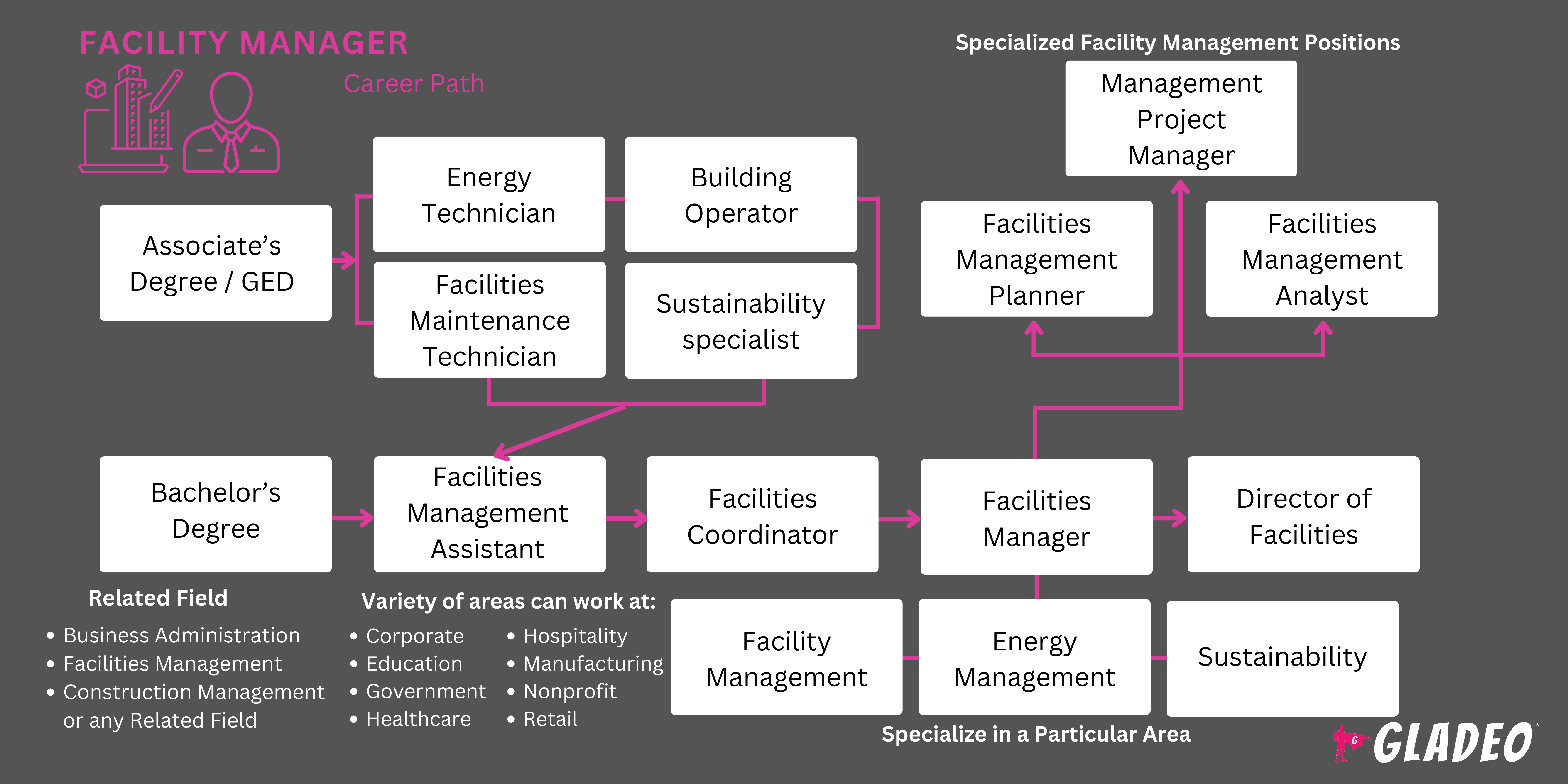Spotlights
Facilities Manager, Property Manager, Building Manager, Real Estate Manager, Asset Manager, Operations Manager (Facilities), Facilities Coordinator, Plant Manager, Site Manager, Maintenance Manager
Have you ever been inside a building and noticed how clean or dirty it looked? Most of us don’t think about it, but taking care of the inside and outside of buildings involves constant effort. The overall job is done by Facility Managers who are in charge of ensuring the daily comfort, safety, and efficiency of building environments for employees and visitors.
Their duties can vary from day to day, but in general, they’re responsible for coordinating and overseeing the work of cleaners, repair persons, plumbers, and groundskeepers. They are also tasked to maintain proper heating and air conditioning, door signage, restroom supplies, and more.
Less frequently, Facility Managers are involved when there’s an office move, hosted event, fire inspection, or renovation work. Their efforts may often go unnoticed, but these behind-the-scenes workers are the unsung heroes of countless buildings around the country!
- Improving workplace efficiency and safety
- Enhancing the operational environment for employees
- Variety in daily tasks and long-term projects
Working Schedule
- Facility Managers typically work full-time and may be on call for emergencies. Overtime may be needed during renovations or events.
Typical Duties
- Oversee and schedule maintenance and repairs of building systems (i.e., HVAC, electrical, plumbing, etc.)
- Ensure facilities comply with applicable health and safety regulations
- Manage facilities-related budgets and forecast expenses
- Coordinate office moves, renovations, and space allocations
- Oversee construction and renovation projects are done safely and that building occupants are kept away from hazards
- Supervise cleaning, landscaping, pest control, security services, and maintenance/repair work
- Control entry to private areas
- Conduct regular inspections to look for repair or upgrade needs
- Negotiate contracts with service providers and suppliers
- Purchase and distribute supplies
- Implement energy-saving measures to reduce costs
- Maintain records of facility usage, maintenance schedules, and associated costs
- Coordinate with IT departments for infrastructure needs
- Lead or participate in emergency planning and preparedness, such as fire drills or incident response
- Properly dispose of surplus property
- Manage building leasing requirements, as directed
Additional Responsibilities
- Stay updated on building codes, regulations, and technologies, such as Internet-of-Things devices and programs
- Develop and implement facility management policies
- Train and supervise facility management staff
- Participate in sustainability efforts
- Liaise with stakeholders, regulatory bodies, and local authorities, as needed
Soft Skills
- Adaptability
- Attention to detail
- Budget management
- Cost efficiency
- Communication
- Conflict resolution
- Customer service
- Dependable
- Leadership and management
- Organizational skills
- Problem-solving
Technical Skills
- Asset management
- Budgeting, scheduling, and coordinating logistics
- Building energy management and sustainability
- Contract negotiation and vendor management
- Contractor performance monitoring
- Facility management software (Systems, Archibus, or IBM Tririga)
- Knowledge of local, state, and federal building codes and regulations (ADA compliance, fire safety standards, environmental regulations, etc.)
- Maintenance scheduling
- Mechanical and electrical systems
- Project management
- Risk assessment and emergency preparedness
- Smart building operations
- Space utilization analysis
- Corporate offices
- Educational institutions
- Facility management service providers
- Government buildings
- Hospitals and healthcare facilities
- Retail and commercial properties
Facility Managers juggle multiple tasks and priorities to ensure the seamless operation of all building functions. The role requires foreseeing and preventing problems before they come up and fixing them when they’re unexpected or unavoidable. They have to oversee the work or behaviors of many other people in the building, such as cleaning crews, repair contractors, and visiting guests.
They must try to manage the expectations of everyone who uses or has a stake in the building. Sometimes this requires finesse and the ability to negotiate compromises when there are disputes. When disputes do arise, Facility Managers may catch some of the blame for decisions beyond their control. Ideally, they have the full support of their organizational leadership, who are often the actual decision-makers.
The rise of smart buildings and sustainability initiatives is having a big impact on the fields of construction and facility management. Facility Managers are increasingly involved in implementing technologies to incorporate automation systems, improve energy efficiency, and reduce carbon footprints.
The Covid pandemic prompted some changes in workplace design, aimed at emphasizing health and safety. Additionally, buildings in certain geographic regions are increasingly affected by weather events and natural disasters. This is prompting Facility Managers to take extra precautions and conduct more emergency preparedness activities.
Most Facility Managers probably didn’t plan on entering the field at an early age, but they might have enjoyed taking good care of their rooms or households. They tend to be very responsible, dependable, organized, tidy, and good at solving logistical problems and leading projects or teams.
- Being a Facility Manager requires a blend of education, work experience, and, in some cases, professional certification
- Most organizations provide at least some On-the-Job training, usually in the form of overlap with the previous Facility Manager or other facilities staff members
- Some workers may land a job with a high school diploma or equivalent if they have sufficient related work experience
- More commonly, Facility Managers earn a certificate or associate degree from a community college
- Certain positions may require a bachelor’s degree in a field like business, management, accounting, or engineering, but there is no hard requirement for a degree. It’s up to the individual employer to determine the educational requirements they want or prefer
- Common course topics may include:
- Building Systems and Operations
- Business and Finance for Facility Managers
- Facility Planning and Design
- Health and Safety Regulations
- Project Management
- Sustainability and Energy Management
- The International Facility Management Association’s Facility Management Professional (FMP) course features four modules (Finance and Business, Operations and Maintenance, Leadership and Strategy, and Project Management) and can be taken via self-paced or instructor-guided lessons. FMP students can enroll in individual modules or the entire course bundle.
- Other certification options include:
- American Hospital Association - Certified Health Care Facility Manager
- American Society of Mechanical Engineers - Municipal Solid Waste Facility Operator
- Association for Facilities Engineering - Certified Plant Maintenance Manager
- International Association of Venue Managers - Certified Venue Executive
- International Facility Management Association -
- Certified Facility Manager
- Sustainability Facility Professional
- National Recreation and Park Association - Aquatics Facility Operator
- BOMI International - Facilities Management Administrator
- U.S. Green Building Council, Inc. - LEED Green Associate
- A college degree is not required for all jobs in this field. Some workers can get started in entry-level positions if they have enough related work experience.
- A community college or vocational school certificate in facility operations or a four-year degree in business administration, engineering, or environmental sustainability (with related courses in facilities management) can help get your foot in the door.
- Programs that offer practical experiences, like internships or cooperative education opportunities with businesses or facility management firms, are particularly valuable.
- Consider the affordability of the program, availability of financial aid, and the institution's connections with industry professionals for future employment opportunities.
- Consider the cost of tuition, discounts, and local scholarship opportunities (in addition to federal aid via the FAFSA)
- Study math, business, and economics courses in high school
- Volunteer for roles in student clubs or teams to build leadership, management, and teamwork skills.
- Seek part-time jobs or volunteer opportunities in settings like offices, schools, or hospitals to gain firsthand experience with facility operations
- Explore internships with facility management companies
- Join professional organizations related to facility management to grow your network
- Pursue certifications like IFMA’s entry-level Facility Management Professional
- Enroll in project management courses or workshops to develop skills
- Take sustainability and environmental studies classes to understand eco-friendly facility management practices
- Learn about the physical aspects of buildings and infrastructure
- Practice using facility management software via online courses or certification programs

- Review job postings on portals like Indeed and Glassdoor. Upload your resume and sign up for new job alerts
- Ask your school’s career counselor or service center for help preparing resumes and looking for jobs
- If needed, apply for entry-level roles such as facilities maintenance technician or facilities management assistant
- Write your Facility Manager resume to highlight relevant education, certifications, internships, and skills. Make sure to avoid any spelling or grammar mistakes
- Mention any facility management software you are proficient in, and list keywords such as:
- Asset Management
- Budgeting and Financial Management
- Emergency Preparedness
- Energy Management
- Facility Operations
- Health and Safety Compliance
- Leadership in Energy and Environmental Design (LEED)
- Maintenance Management
- Project Management
- Space Planning
- Vendor Management
- Review common Facility Manager interview questions to practice your replies in mock interviews
- Read up on trends and be familiar with the technologies and terminology
- Prepare for interviews by researching the hiring organization’s website to learn about their mission and typical clients
- If given the names of the persons who will interview you, look up their professional biographies to learn a little about them
- Stay informed about current industry trends, developments, and new terminologies
- Express your interest in career advancement to your supervisors. Ask for additional responsibilities or projects that could prepare you for higher-level positions!
- Seek a mentor for guidance and professional development
- Demonstrate reliability and establish a reputation as a competent, innovative manager
- Provide outstanding customer service. Treat visitors with dignity and respect
- Be a thoughtful supervisor who takes care of people and inspires them to do their best
- Pursuing advanced or additional certifications such as the International Facility Management Association’s Certified Facility Manager or Sustainability Facility Professional, or the U.S. Green Building Council’s LEED Green Associate
- Consider earning a graduate degree in business (MBA). It could qualify you for management positions
- Go above and beyond your daily duties by joining workplace committees and groups
- Be active within professional organizations
- If necessary to advance, consider applying to another company if you see a job opening
- Read industry news and participate in discussion groups to learn about trends
Websites
- American Hospital Association
- APPA: Leadership in Educational Facilities
- ARMA International
- BOMI International
- Building Operating Management Magazine
- Building Owners and Managers Association International
- CoreNet Global
- Facilities Net
- Facility Executive Magazine
- Facility Management Journal
- Healthcare Facilities Management Magazine
- Institute of Certified Records Managers
- International Association of Venue Managers
- International Facility Management Association
- National Association of State Facility Administrators
- National Facilities Management & Technology
- ProFM
- Society for Maintenance & Reliability Professionals
- U.S. Green Building Council, Inc.
Books
- Facility Management for Beginners: The New Facility Managers Quickstart Guide to Becoming a Facility Superhero, by Gary Ward
- The Complete Guide to Facility Management, by Dan Lowry
- The Facility Management Handbook, by Kathy Roper and Richard Payant
Whenever a worker or visitor within a building has a problem related to the building, they bring their complaints to the Facility Manager, who has to look into the issue and try to resolve it.
As a result, Facility Managers stay busy and wear many hats, often switching roles several times throughout the day. Not everyone enjoys this type of work, so if you’re curious about some other professions, check out the below list of similar jobs!
- Architectural Manager
- Civil Engineer
- Construction and Building Inspector
- Cost Estimator
- Environmental Sustainability Coordinator
- Health and Safety Officer
- Landscape Architect
- Operations Manager
- Project Manager in construction or renovations
- Property, Real Estate, and Community Association Manager
- Real Estate Manager
- Urban and Regional Planner
Newsfeed

Featured Jobs

Online Courses and Tools







